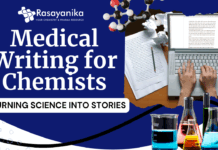Data Science + Chemistry: Unlocking a Promising Career Path
In today’s data-driven world, the combination of data science and chemistry offers a promising career path for individuals interested in leveraging their skills in both fields.
The convergence of these two disciplines has opened up new avenues for innovation and discovery, allowing professionals to tackle complex challenges in various industries such as pharmaceuticals, materials science, and environmental research. This article explores the synergies between data science and chemistry and highlights the skills, opportunities, and impact that this interdisciplinary field can have on society. The Intersection of Data Science and Chemistry
1.1 Understanding Data Science
Data science is an interdisciplinary field that combines statistical analysis, machine learning, and programming to extract insights and knowledge from large volumes of data. Data scientists utilize various techniques to process, clean, and analyze data, ultimately deriving meaningful patterns and trends to drive decision-making and solve complex problems.
1.2 The Role of Chemistry
Chemistry, on the other hand, is the study of matter, its properties, composition, and transformations. It plays a vital role in understanding the fundamental principles of the physical world, including the development of new materials, drugs, and sustainable energy solutions. Chemistry encompasses fields such
as organic chemistry, inorganic chemistry, analytical chemistry, and physical chemistry, each focusing on different aspects of the discipline.1.3 The Synergy
The integration of data science and chemistry leverages the power of data-driven approaches to enhance research, analysis, and development within the chemical sciences. By utilizing data science techniques, chemists can analyze vast amounts of data more efficiently, uncover hidden patterns, and accelerate the discovery of novel materials or compounds. Simultaneously, chemical knowledge helps data scientists interpret and contextualize the results obtained from data analysis, ensuring accurate and meaningful conclusions.
Applications in Pharmaceutical Research
One of the most promising areas where data science and chemistry converge is pharmaceutical research. The development of new drugs is a complex and time-consuming process that requires the analysis of vast chemical datasets, understanding molecular interactions, and predicting compound properties. By employing machine learning algorithms and data analysis techniques, data scientists can expedite the drug discovery process, identify potential drug candidates, and optimize molecular structures for enhanced efficacy and safety. Data-driven approaches also aid in predicting drug-target interactions, improving the efficiency of clinical trials, and optimizing drug formulation and delivery systems.
Materials Science and Computational Chemistry
Materials science is another domain where the integration of data science and chemistry has a significant impact. The design and development of new materials with desired properties rely on a deep understanding of the structure-property relationships and complex interactions at the atomic and molecular level. Data science techniques, such as molecular modeling and simulations, can predict material properties, optimize formulations, and accelerate the discovery of innovative materials for applications in electronics, energy storage, catalysis, and more. The combination of data science and chemistry enables researchers to efficiently explore vast chemical spaces, identify promising candidates, and reduce the need for extensive experimental testing.
Environmental Monitoring and Sustainability
The intersection of data science and chemistry also holds immense potential for addressing environmental challenges and promoting sustainability. By harnessing data analytics, chemists can analyze large datasets related to environmental monitoring, pollution levels, and climate change. Data science techniques enable the identification of trends, patterns, and correlations, providing insights into the impact of human activities on the environment. This information can be used to develop more efficient and sustainable processes, optimize resource utilization, and guide policy-making decisions aimed at reducing pollution and mitigating climate change.
Skills and Training for Data Science + Chemistry
To pursue a career in the intersection of data science and chemistry, individuals need to develop a diverse set of skills. Proficiency in programming languages such as Python, R, or MATLAB is essential for data manipulation, analysis, and visualization. Additionally, knowledge of statistics, machine learning algorithms, and data modeling techniques is crucial for extracting insights from complex datasets. A strong foundation in chemistry, including an understanding of molecular structures, chemical reactions, and spectroscopic techniques, is also essential to effectively apply data science methods in chemical research. Continuous learning, staying updated with the latest advancements in both fields, and collaboration with domain experts are vital for success in this interdisciplinary career path.
Career Opportunities and Outlook
The integration of data science and chemistry has created a wide range of career opportunities across industries. Pharmaceutical companies, research institutions, chemical manufacturers, and environmental organizations actively seek professionals who can bridge the gap between data science and chemistry. Data scientists with a solid background in chemistry are highly valued for their ability to derive insights from complex chemical datasets and guide decision-making processes. Conversely, chemists equipped with data science skills can contribute to accelerated discovery, optimization, and innovation within their field. The demand for professionals with expertise in both areas is expected to grow significantly as industries increasingly recognize the potential of data-driven approaches. Conclusion The convergence of data science and chemistry holds immense promise for driving innovation, discovery, and problem-solving across various domains.
The integration of data science techniques with chemical knowledge enables researchers and professionals to analyze complex datasets, expedite drug discovery, optimize materials, monitor environmental impacts, and develop sustainable solutions. As industries continue to leverage the power of data-driven approaches, individuals equipped with skills in both data science and chemistry will find themselves at the forefront of cutting-edge research and development, shaping a brighter and more sustainable future.
| Section | Key Points |
|---|---|
| Understanding Data Science | – Data science combines statistical analysis, machine learning, and programming to extract insights from large volumes of data. |
| – Data scientists use various techniques to process, clean, and analyze data for decision-making and problem-solving. | |
| The Role of Chemistry | – Chemistry is the study of matter, its properties, and transformations. |
| – Chemistry plays a crucial role in developing new materials, drugs, and sustainable energy solutions. | |
| The Synergy | – The integration of data science and chemistry enhances research, analysis, and development within the chemical sciences. |
| – Data science helps chemists analyze data efficiently, while chemical knowledge helps interpret the results accurately. | |
| Applications in Pharmaceutical | – Data science accelerates drug discovery, predicts drug-target interactions, and optimizes formulation and delivery systems. |
| Research | – Machine learning and data analysis techniques identify potential drug candidates and enhance clinical trials’ efficiency. |
| Materials Science and Computational Chemistry | – Data science techniques predict material properties and optimize formulations for materials science applications. |
| – Molecular modeling and simulations enable the discovery of innovative materials for electronics, energy storage, etc. | |
| Environmental Monitoring and | – Data science and chemistry help analyze environmental datasets, monitor pollution levels, and understand climate change impact. |
| Sustainability | – Insights derived from data analytics guide the development of sustainable processes and resource utilization optimization. |
| Skills and Training for Data | – Proficiency in programming languages (Python, R, MATLAB) and data manipulation, analysis, and visualization are essential. |
| Science + Chemistry | – Knowledge of statistics, machine learning algorithms, and data modeling techniques is crucial for extracting insights. |
| – A strong foundation in chemistry is necessary to apply data science methods effectively in chemical research. | |
| Career Opportunities and Outlook | – The integration of data science and chemistry creates diverse career opportunities in pharmaceuticals, research, and more. |
| – Professionals with expertise in both areas are highly valued for their ability to bridge the gap between data science and chemistry. | |
| Conclusion | – The convergence of data science and chemistry drives innovation, discovery, and problem-solving across various domains. |
| – Professionals in this interdisciplinary field shape a brighter and more sustainable future through data-driven approaches. |
As a first-time biotech graduate seeking guidance from a mentor, it’s essential to ask questions that can help you navigate your career path and gain valuable insights. Here are some suggested questions to ask your mentor:
1. What career paths are available for biotech graduates, and what are the typical entry-level positions in the industry?
2. What skills or knowledge areas should I focus on developing to enhance my employability in the biotech field?
3. Are there any specific certifications, courses, or additional qualifications that would be beneficial for someone starting their career in biotech?
4. How can I effectively network within the biotech industry and build professional relationships?
5. Can you provide guidance on crafting a strong resume and cover letter tailored to the biotech industry?
6. What are some strategies for finding job opportunities in biotech, and how can I stand out as a recent graduate?
7. Are there any professional organizations or associations related to biotech that you recommend joining?
8. Can you share your personal experiences and lessons learned from your career in biotech that may help me navigate challenges or make informed decisions?
9. How can I stay updated with the latest advancements and trends in biotech to remain competitive in the field?
10. Are there any mentorship or internship programs in the biotech industry that you would recommend for someone at my career stage?
Looking for latest chemistry and Pharma job openings, follow Rasayanika Facebook and Telegram and subscribe to our youtube channel for the latest updates on chemistry and Pharma jobs and much more

















































